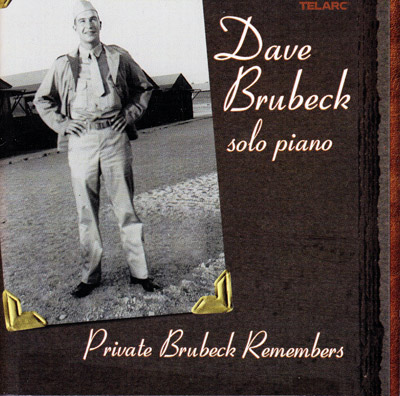
.jpg)

Private Brubeck Remembers

Label: Telarc
Year: 2004
Released on LP: No
Released on CD: Yes
Tracks
CD 1
1. For All We Know
2. Something to Remember You By
3. Don't Sit Under the Apple Tree (With Anyone Else but Me)
4. Don't Worry 'Bout Me
5. For You
6. Where or When
7. Lili Marlene
8. It's a Sin to Tell a Lie
9. When I Grow Too Old to Dream
10. We Crossed the Rhine
11. Please Be Kind
12.Weep No More
13.The Last Time I Saw Paris
14.You'd Be So Nice to Come Home To
CD2
Dave Brubeck remininses with Walter Cronkite about his WW2 experiences.
Personnel
Dave Brubeck (piano)Notes
1. "The titles of the tunes are almost an autobiography of my war years..." - Dave Brubeck .
2. Also released by Telarc in SACD format.
3. Bonus CD 2 - an interview with Walter Cronkite was a limited edition release.
Reviews
Concord Music Group – Copyright
Dave Brubeck, one of the most influential jazz pianists of the 20th century, may have had a very different career—and indeed a very different life—were it not for a fortunate turn of events during his tour of duty in the U.S. Army during World War II.
Shortly after D-Day—June 6, 1944—a 23-year-old Pfc. David Brubeck and the rest of his company in Patton’s Third Army were camped outside the French city of Verdun, not far from the front lines. A Red Cross truck with a piano loaded on the back drove up, and Brubeck volunteered to play a few songs to entertain the rest of the troops. The next morning, he was headed for the front—and an uncertain future—until a colonel called him back and insisted that he stay behind and form a band.
As head of the Wolf Pack Band (the name was a tongue-in-cheek reference to the German submarine fleet), Brubeck spent the rest of his military service as a musician and entertainer. Although he served his country on the bandstand rather than in the trenches, he was no stranger to the perils of war. He and his band played for the troops behind enemy lines at the Battle of the Bulge. In Germany, they crossed the Rhine on a hastily built pontoon bridge at Remagen.
On May 25, 2004, just in time for the 60th anniversary of D-Day—the Allied invasion of Normandy Beach in France, and the turning point in a war that changed the world—Telarc will release Private Brubeck Remembers. The album is a collection of uniquely crafted, solo piano renditions of some of the most famous songs from World War II, many of which Brubeck played during his tour of duty with the Wolf Pack Band.
“The titles of the tunes are almost an autobiography of my war years,” says Brubeck. “I think every person who has ever worn a military uniform can relate to my story.”
The list of fourteen tracks will sound familiar to anyone who remembers the World War II era, or any student of the period.
Included in the mix are a pair of Brubeck originals, both penned during the last years of the war. “We Crossed the Rhine” is built on the rhythm of the heavy equipment trucks crossing the bridge at Remagen, while “Weep No More” is a ballad that Brubeck wrote for his wife, Iola, after Germany surrendered and the war in Europe was over.
This year, as the world celebrates the 60th anniversary of the liberation of Europe, relive the final years of World War II with a young soldier who would later become a jazz legend.
All Music Guide – review – Copyright
In early 2004, Dave Brubeck reminisced about his days as a soldier during World War II for this two-CD set, playing solo piano interpretations of songs from that era. Brubeck, then recently married and promptly drafted after graduating from the College of the Pacific, almost ended up in combat before getting an opportunity to play with an army band, which caused a music-loving colonel to install the young private as director of the band. The music chosen seems to convey a special message to his wife, Iola, with bittersweet ballads ("For All We Know"), a jaunty "Don't Sit Under the Apple Tree (With Anyone Else but Me)," and the dreamy interpretation of "Where or When." A surprising choice is "Lilly Marlene," a European song frequently played by Nazi propagandist broadcaster Axis Sally, which Brubeck is able to play in a lush setting.
After the Germans succeeded in destroying nearly every bridge which crossed the Rhine River into their homeland in advance of the Allies, the bridge at Remagen was finally captured, though Brubeck's unit had to make due with a pontoon bridge due to its damaged state. His "We Crossed the Rhine" is a tense piece that evokes the still-dangerous conditions as they made their way into Germany. "Weep No More" is Brubeck's poignant ballad to his wife to let her know that he is out of danger for good, with the war in Europe at an end. He concludes the first disc with a dramatic interpretation of "You'd Be So Nice to Come Home To."
This limited-edition release is one of the most unique items in Brubeck's considerable discography, and should be snapped up without hesitation.
Ken Dryden
© Rovi Corporation. All Rights Reserved